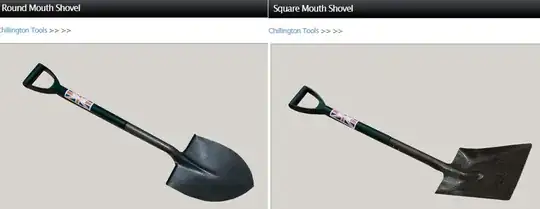Portuguese for shovel is pá, a spade is thought of by Portuguese speakers as a type of pá, and most people won't know any name for it other than pá (I didn't). So if precision is not required you can call a spade pá. Say, you could point to a spade and ask, “Posso usar aquela pá?” If precision is required, you do indeed find lots of Brazilian online shops that sell spades under the name pá de corte or, as mentioned in Ramon’s answer, vanga. Just look up pá de corte and pá vanga in Google Images. For instance this Brazilian merchant’s website, partially reproduced below, calls the spade both pá de corte and vanga.

These names do not appear in standard dictionaries. I did however find vanga in some specialised dictionaries, such as this one and this one. Standard dictionaries such as Houaiss and Aulete have pá direita (‘straight pá’) with the meaning of spade though. Here’s Aulete:
1 Tipo de pá adequado para cavar a terra.
But then you basically will not find pá direita on the web. I found a few examples of pá reta though; reta meaning the same as direita in this context.
So the most common names are pá de corte and vanga. However these names appear almost only in merchant’s websites. You’ll find them in only a half-a-dozen recent books in Google Books (this compares to more than 500 books containing enxada, ‘hoe’). This shows these names are mainly trade jargon, and largely unknown to the layman.
As you may have gathered from people’s reaction so far, if you show a Portuguese speaker a spade or a shovel the odds are they’ll indifferently tell you it is a pá. That is how I would react, and I come from a family of farmers. I am from Portugal, and don’t know how typical my experience would be in Brazil or indeed in other parts of Portugal. We had all sort of agricultural tools at home, but no spades; for digging farmland we only used hoes. We had round mouth shovels, just pá, and square mouth shovels, or pá quadrada. Both are used to lift soil, sand, etc. and carry, pour or throw it somewhere (spades are not good for that because they're narrow, flat and without raised edges, so the soil would fall off the edges); round mouth shovels are good to thrust into a pile of stuff, whereas square mouth are better to gather stuff that is more scattered on flat surfaces.
 This is a pá, or pá de bico if you must be precise; and this is a pá quadrada, but simply pá will also do.
This is a pá, or pá de bico if you must be precise; and this is a pá quadrada, but simply pá will also do.

